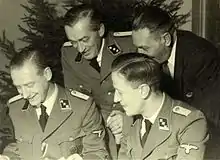Ferdinand aus der Fünten
Ferdinand Hugo aus der Fünten (17 December 1909 – 19 April 1989), widely known as Fünten, was an SS-Hauptsturmführer and head of the Central Office for Jewish Emigration in Amsterdam during the Second World War. He was responsible for the deportation of Jews from the Netherlands to the German concentration camps and was convicted as a war criminal.

Life
A native of Mülheim in the Ruhr, in the early years of Nazi Germany Fünten was employed in the Jewish section of the Reich Main Security Office, under the command of Adolf Eichmann. After the occupation of the Netherlands by German troops, Fünten became head of the Central Office for Jewish Emigration in Amsterdam. In this capacity, he was subordinate to the commander of the Sicherheitspolizei and the SD in The Hague. As head of the Central Office for Jewish Emigration, he organized the registration and arrest of Dutch Jews. Those arrested were taken to the Westerbork transit camp and deported to concentration and extermination camps in German-occupied Poland. Among those deported were sick and insane Jews from Amsterdam and Apeldoorn. Fünten threatened Jews who had married non-Jews with deportation, in order to force their sterilization. He held the rank of Hauptsturmführer in the SS in 1941.
After the war, Fünten was brought to trial and on 12 July 1950 was sentenced to death by the Netherlands. The death penalty was commuted to life imprisonment on 4 January 1951. He was imprisoned at Breda with Willy Lages, Joseph Johann Kotälla and Franz Fischer (SS-Sturmbannführer) as one of the "Breda Four", the only German war criminals of the Second World War to be imprisoned in the Netherlands. Lages was released in 1966 due to serious illness, although he lived for another five years, Kotälla died in prison.
During the 1960s, discussions started about whether the remaining prisoners should be set free, since the "Breda Four" were the only German war criminals still in captivity in the Netherlands. Politicians who favoured releasing them were met with staunch opposition from the people of the Netherlands. In 1988, the Dutch government under Prime Minister Ruud Lubbers decided to release Fischer and Fünten. The news led to mass demonstrations against the decision and to emotional debates.[1] However, the two men were released on 27 January 1989 and deported to Germany. On 19 April 1989, shortly after his release, Ferdinand aus der Fünten died at Duisburg.[2]
References
- "De Drie van Breda". isgeschiedenis.nl.
- This article incorporates information from the corresponding article in the German Wikipedia
External links
![]() Media related to Ferdinand aus der Fünten at Wikimedia Commons
Media related to Ferdinand aus der Fünten at Wikimedia Commons